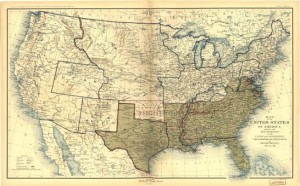 In Charles Town, West Virginia, Union General Ulysses S. Grant meets with General Phil Sheridan in order to discuss the situation in the Shenandoah Valley.
In Charles Town, West Virginia, Union General Ulysses S. Grant meets with General Phil Sheridan in order to discuss the situation in the Shenandoah Valley.
The problem is Confederate General Jubal Early, who continues to harass Union forces and the civilian population. With Mobile and Atlanta in Union hands (two of four major goals Union military brass had established early in the year), Grant is ready to aggressively pursue Early and take control of the valley (seizing the Shenandoah Valley being the third of the four goals). Should this mission be accomplished, the last major remaining objective would be to conquer Richmond, of which the ongoing siege of Petersburg is instrumental.
When all four objectives are realized, Lincoln is certain that the Confederacy will have no recourse but to surrender.
Meanwhile, Baptist activity in the South is on the decline. Many churches are shuttered (or are now pastored by Baptist pastors from the North), including an increasing number in Georgia. Baptist newspapers are sporadically published; mission activity and funding is severely decreased and focused almost exclusively on army-related efforts; and some associational meetings have been canceled this fall.
The exception is black Baptists who are now freedmen and who in the past two years have formed churches in record numbers, enjoying true autonomy for the first time.
The growing reconfiguration of Baptist life in the South portends what lies ahead should the Confederacy be forced to surrender to the Union.
Sources: “Valley Campaigns of 1864” (link)


